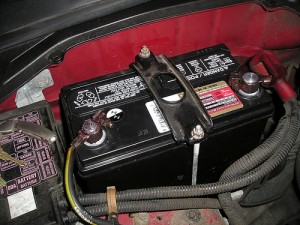 Most folks know that car batteries wear out just like any other battery and need to be replaced. There are a couple things drivers should know and keep in mind as a guide to battery replacement. One is cold cranking amps and the other is reserve capacity.
Most folks know that car batteries wear out just like any other battery and need to be replaced. There are a couple things drivers should know and keep in mind as a guide to battery replacement. One is cold cranking amps and the other is reserve capacity.
We’ll start with cold cranking amps. Think of this as the power output used to start a cold engine. The number of cold cranking amps you need depends on your vehicle and where you live, or specifically, how cold it is where you live. Two factors to consider are that the colder an engine is, the more power it takes to turn the engine over to get it started. It has all that cold, sluggish oil to contend against. The second factor is the chemical reaction in the battery that creates electrical energy is less efficient in the cold.
So the colder the weather gets, the more power is needed, but is unavailable. So if you live where it’s cold, you need a battery with more cold cranking amps than you would where it’s moderate or hot. You should always get at least as many cold cranking amps as are recommended but you may want to upgrade if you live where it gets really cold.
An important guide: Batteries may also list the Cranking Amps-CA-number. It is the Cold Cranking Amps – or CCA – that is the number you’re interested in here. CCA is the number to use in your comparisons when you’re shopping for a battery replacement.
With all this talk of cold temperatures, it’s also important for drivers to note that heat is the real enemy of long battery life. In other words, the damage that’s done over the summer months shows up with the increased demands on the battery when the weather turns cold.
Now let’s talk about reserve capacity: It’s the measurement of the number of minutes of reserve power the battery has at a given load. The number is more important these days because of parasitic drain. Parasitic drain is the battery energy that’s used when the key is off. This is the power drawn by the security system, the remote start system, and even the power the computers require to maintain their memory.
Reserves are also needed when you make very short trips, you’re not driving long enough for the vehicle battery to recover the energy it used just to start the engine.
A basic guide to battery replacement is to go with the recommended minimum unless you believe you need more and want to upgrade. Talk to your friendly and knowledgeable pros about your options.
